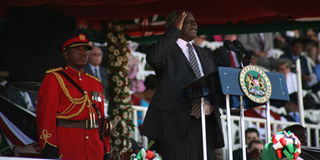Kenya's Kibaki says coalition not in crisis

President Kibaki addresses the nation during the 46th anniversary of Madaraka Day at the Nyayo stadium on Monday. He said the government was not in crisis. Photo/HEZRON NJOROGE
What you need to know:
- Coalition has been accused of internal bickering, failing to tackle corruption, slow progress on political reform, and inability to stem economic decline.
- Officials from both factions frequently squabble in public, on subjects ranging from protocol to policy.
- Dysfunctional nature of the coalition has slowed government business and paralysed parliament.
Kenya's President Kibaki said on Monday the coalition government was not in crisis, even as his Madaraka Day speech drew brief heckling from the crowd.
The coalition has been accused of internal bickering, failing to tackle corruption, slow progress on political reform, and inability to stem economic decline.
"A number of concerns have been raised over the state of the Grand Coalition," Kibaki said at Nyayo National Stadium on Kenya's 46th anniversary of independence from former colony Britain.
"Occasional disagreements should not be construed to mean that the country or government is in a crisis."
Kibaki, 78, formed a coalition government with opposition leader Raila Odinga in early 2008 to halt violence after a disputed election that killed 1,300 people, displaced several hundred thousand, and paralysed key sectors of the economy.
Though it brought peace to Kenya, the coalition has been roundly criticised at home and abroad for internal bickering, failing to tackle corruption, slow progress on political reform, and inability to stem economic decline.
Odinga, now prime minister, has openly criticised Kibaki, while the president's senior aides have answered in kind. Officials from both factions frequently squabble in public, on subjects ranging from protocol to policy.
The dysfunctional nature of the coalition has slowed government business and paralysed parliament.
Underlining high public disillusionment, some people began shouting at the beginning of Kibaki's speech, but were quickly dragged out of the football stadium by police, witnesses said.
With stones and mud hurled towards Kenyan officials at other recent events, security was tighter than usual.
Kibaki insisted government critics were not being fair.
"I wish to assure Kenyans and our friends that the Prime Minister and I are determined to ensure that the Grand Coalition functions harmoniously," he said, flanked by Odinga.
"We are fully committed to faster and sustainable development, peace, unity and stability."
Kibaki reiterated government projections for 2-3 percent gross domestic product growth in 2009, up from 1.7 percent last year, which was an alarming fall from 7.1 percent in 2008.
"As we all appreciate, the economic slowdown we are experiencing has negative implications on the living standards of our people and especially on our efforts towards poverty reduction and employment creation," he said.
"In spite of these indications, however, the prospects for our economy are not as bleak. Indeed, some sectors of the economy, particularly manufacturing, building and construction, have performed well.
"With sound macro-economic policies, as well as the reduction in the cost of fuel, agricultural inputs and other interventions by Government, our economy is projected to grow by between two and three per cent this year."
Kibaki said government efforts to generate an extra 300,000 jobs in Kenya, and announced he would next week inaugurate a first undersea fibre-optic cable in Mombasa port that is seen as essential to telecommunications progress in the region.
The president also said he was extending tax-free concessions for imported maize until the end of 2009 to alleviate food shortages around Kenya. And he announced a national census to begin on August 24.
Heavily criticised for delays in reforms such as a new constitution, Kibaki said such a charter could come this year.
"I am appealing to the political parties and all Kenyans to desist from taking rigid and partisan positions so that we can get a new constitution within the next few months," he said.




